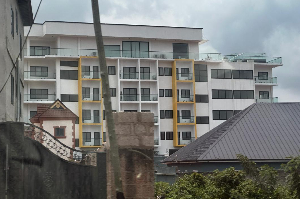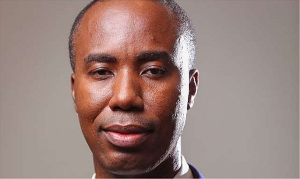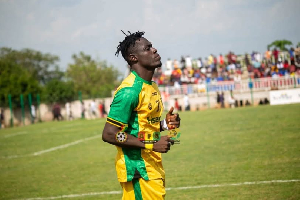In a rather bizarre compromise on 12/2/2002, the Attorney General, representing the executive, honorable Dan Abodakpi, a member of the legislature, and Justice Steve Farkye, presiding at an Accra Fast Track Court reached a compromise that, in my opinion, undermines the equality before the law clause of the constitution.
The silent ?constitutional coup? started when honorable Dan Abodakpi, MP for Keta, informed the court that the court's proceedings were affecting his work, as an MP, and he could only appear before the court on Mondays. Needless to say, this was bunkum as the constitution makes it clear that nobody is above the law. Most defendants have one form of work or the other and for the court to accede to this request will require a showing that MPs are different and must be treated differently before the law. Article 17 (1) is, however, emphatic in its declaration that ?All persons shall be equal before the law.? If the court should get into the habit of setting its schedule to suit the work schedule of some litigants, but not others, will that not be putting the court in a difficult situation of defining what constitutes an "excusable or privileged profession?" Not only will this be a difficult task, but even if it were doable, the court will, if it accepts the honorable MPs plea, be telling us that we are not all equal before the law, contrary to the unambiguous language of article 17 (1). Some citizens, by virtue of their political status or profession, are so important that the courts must create a special calendar for them! Of course, the court could, if it wishes, apply the same rule to everyone, which is the essence of the rule of law, in contrast to the rule of man, but such a calendar will make hooey of a justice system that, by any standard, is sorely in need of repairs!
I fully expected the Attorney General (AG) to argue vehemently against this plea. As the Minister of Justice (MJ), one expects that equal protection of the law will be paramount in his legal calculus. Nevertheless, because the AG/MJ is also an MP, one had to wonder whether he would be willing to argue against this plea, and if he does argue, whether he would do so in a vigorous fashion?
In what has to be the most stunning legal position taken by an AG's office that is notorious for taking questionable legal positions, the Director of Public Prosecutions, Mr. Osafo Sampong, "noted that the prosecution did not want to precipitate any constitutional crisis and therefore, suggested that the trial should be scheduled for Mondays only."
What constitutional crisis inheres in applying the court's rules to all defendants? What constitutional crisis inheres as a result of giving a speedy trial to an MP, who is charged with stealing $400,000? Why is a rule that schedules trials of MPs on Mondays and a trial for his codefendants, and all other defendants, on all other days, not precipitating a constitutional crisis? The law is rather clear on what should happen to any defendant who fails to show up at the command of the court. Further, if honorable Abodakpi felt his parliamentary rights were being abridged or otherwise being devalued, it was up to him to seek relief from the Supreme Court. But how will seeking such a relief rise to being a constitutional crisis?
Further, it must be emphasized that questions about the rights of defendant MPs, as it is for all other defendants, are not political and, therefore, cannot be resolved by the Parliamentary Privileges Committee or any other Committee of Parliament. Such questions are quintessentially judicial and only resolvable by the judiciary as clearly specified in article 125 (3): ?The judicial power of Ghana shall be vested in the Judiciary, accordingly, neither the President nor Parliament nor any organ or agency of the President or Parliament shall have or be given final judicial power.?
Of course, in light of the public interest in how this issue is resolved, not to mention the potential conflicted AG, one would have expected the GBA, CDD and the CPIL (Center for Public Interest Law) to brief the court, as ?amicus curiae.? This was not to be, which is not all that surprising, in light of the short notice and the reasonable expectation that the writ will be dismissed as frivolous.
But now that we have been surprised, by the ruling, one would expect that these bodies are busy preparing writs for the Supreme Court, which may not matter as the Supreme Court may take two years to address any issues raised, as evidenced by the court's unwillingness to address the simple question of whether the President is unable to perform his functions when he travels abroad (SC 3/2002 filed in February 2002)!
And our busy media, which delights in creating scams where non exists, was unusually silent on this ruling with extraordinary consequences. In fact, I scanned all the papers with a presence on the World Wide Web and only Chronicle mentioned this ruling. And even Chronicle, mentioned that in passing, in one sentence! By way of contrast, Atta Mills' statements that chairman JJR had never slapped him garnered front-page status in most of the media.
But if Abodakpi had the right to file his writ, no matter how flippant, and the AG's office had the duty to respond, albeit in a rather unsatisfactory manner, the ultimate resolution of the matter laid in the hands of Justice Farkye. It is the court, and its judges, that are empowered to ensure that justice prevails in the country. I fully expected Justice Farkye to reject the plea, with the rhetorical question, why the special rule for MPs?
But to my chagrin, although the initial 5-4 decision in the FTC case (SC writ 2/2002) should have prepared me for such surprises from our courts, the court resolved to sit on the case only on Mondays to enable Dan Abodakpi attend to his parliamentary duties.
One must ask, what happens to those charged with the MP, who are not MPs? What if they wish for a speedy trial? Why are their interests subordinated to the MPs? Why should Selormey, a codefendant, be robbed of his right to a speedy trial to accommodate Abodakpi's work schedule? And if this decision is allowed to stay, how will justices of the lower courts, applying the concept of ?stare decisis,? react to other defendants? likely request for the courts to accommodate their professional calendar? Will this Farkye surprise not plunge us into near chaos, if we are not already there?
What is the legal principle or basis that the AG?s office applied to conclude that prosecuting a citizen, even if an MP, will precipitate a constitutional crisis? Are MPs above the law? Why is an MPs work more important than a farmer, minister, doctor, nurse, teacher, student, civil servant, judge, etc.
Or did the AG?s office rely on article 118 (1), which stipulates that ? Neither the Speaker, nor a member of, nor the Clerk to, Parliament shall be compelled, while attending Parliament to appear as a witness in any court or place out of Parliament.? Clearly, this article applies only when MPs are to appear as witnesses. A defendant MP cannot avail himself of this clause, for to allow that to happen will effectively shut the door on the prosecution. But so that there is no residual doubt, even if a defendant MP mistakenly took the position that he cannot be compelled to defend, a rather untenable situation, that mistaken position should be of no moment to the prosecution and the court?s calendar.
One, of course, can resort to convolution and argue that a defendant MP is a witness for the defense and therefore article 118 (1) applies. But, even if one concedes this tortuous argument, we are left with the solution that a criminal defendant has knowingly and intentionally abrogated his constitutional right to appear in his own defense. But this is hardly a new or exciting principle. The law is rather clear that no defendant can be compelled to be a witness in his own case. Article 19 (10) restates this principle: ? No person who is tried for a criminal offence shall be compelled to give evidence at the trial.? And why did Justice Farkye make this exception? Any concerns about honorable Abodakpi not being present for the trial was resolved once he was duly notified of the trial (supra Article 19 (3a)). Further, it is also well established that a person charged with a criminal offense shall be permitted to defend himself before the court in person or by a lawyer of his choice (supra Article 19 2(F)). A team of lawyers is defending the honorable MP! Put more bluntly, Justice Farkye has a duty to proceed with the trial with or without Abodakpi. The tests of proper notification and adequate defense have clearly been met.
Further, is Justice Farkye not presiding at a FTC? What is fast track about sitting only on Mondays? Why fast track a case, only for the judge to decide that he is only going to sit on Mondays? FTC is FTC not MTC (Monday Track Courts)! When this strange ruling is conjoined with the miscellaneous interlocutory appeals, one begins to wonder whether this case will be finished anytime soon!
This decision to sit on only Monday is ridiculous! Countrymen, we have a new aristocratic class in Ghana, who are flouting the constitution with perfect impunity. Whether it is taking loans that are structured to be ?give-away? or in justifying being absent from and late to parliament, or zany boycotts, our MPs are certainly doing their utmost to give democracy a bad name!
Our politicians and justices need a wake up call! They are falling asleep on their Democratic Elephant or, is it, under their Democratic Umbrella?















